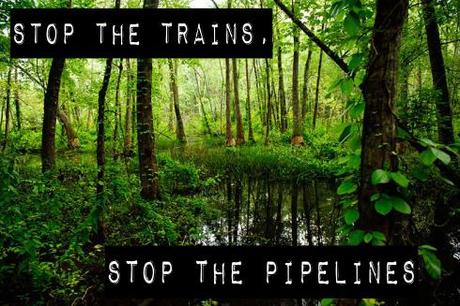by Russ McSpadden / Earth First! Newswire

Sweet Home Alabama wetlands are poised to be toxified by tar sands. But single train line also provides an interesting chock point for would be blockaders.
Back in 2011, when Gulf Coast residents were still reeling from the BP oil spill disaster, a pipeline company, Plains Southcap, LLC received a quiet approval to build a 45-mile pipeline in Montgomery Co. Alabama. Once constructed, the pipeline “capable of transporting 150,000 barrels of oil per day when completed” will run from Ten Mile terminal in Mobile — where tar sands oil carried south from Canada on train can be unloaded — under the Mobile river, through dozens of wetlands and end up in Pascagoula, Miss. where it can be refined.
According to a local Mobile news source, Canadian companies like Canadian National and ARC Terminals plan to expand tar sands crude deliveries to Mobile by way of Canadian National’s railways. Once in Mobile, the heavy, thick crude will need to be processed with lubricants and other chemicals to ready it for pipeline delivery.
In collaboration with Canadian National, Arc Terminals plans include transportation of oil from a rail station to the other side of Mobile river with a pipeline to an Arc Terminals storage facility. The new train-station, which will bring crude bearing freighters through downtown Mobile, and, according to plans, could see 75,000 barrels or up to 120 tank cars per day packed with crude, is scheduled to start operation later this month.
According to John Blanchard, president of Arc Terminals, “The Mobile facility – the first rail tank car crude-oil unloading terminal in Alabama – will provide good access to Gulf Coast refineries and allow quick turnaround of tank cars, increasing product delivery and fleet velocity and reducing costs for car owners.
“The rail transload terminal will handle heavy crude oil from Western Canada and light crude oil from the Bakken basin via CN, which will provide Canadian producers single-haul service to our Mobile destination. A single-line haul is more efficient and less expensive than those involving two or more rail carriers and multiple terminal switching.”
While the Keystone XL pipeline has reached the level of national debate and protest, intermodal operations including train deliveries of tar sands to a web of smaller pipelines has largely gone under the radar. Should the Keystone pipeline be defeated, the tar sands industry may not even notice or care, having effectively created alternative means of delivery under all of our noses.

cartoon by Stephanie McMillan
If recent tar sands spills in Kalamazoo, Michigan and Mayflower, Arkansas are any indicator, a pipeline running through the wetlands of southern Alabama and Mississippi will be a social and environmental nightmare. The U.S. South has the richest aquatic fauna of any temperate area in the world, comparable to the tropics, but its waterways and wildlife are turning toxic and vanishing at a terrify pace. The fight against tar sands oil is the fight against industrial expansion, colonialism on indigenous lands in Canada and the U.S., climate change, and in this case, it is a fight in defense of beleaguered Gulf Coast communities, as well as a most remarkable network of rivers and wetlands teeming with a diversity of life.

